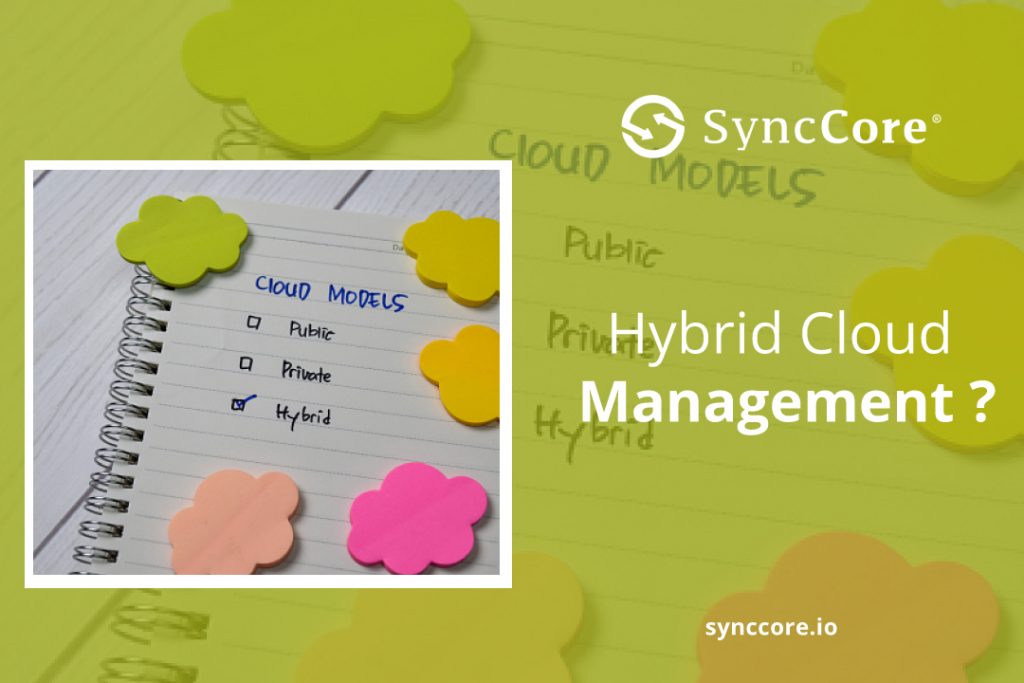
Table of Contents
Hybrid Cloud Management
While several organizations have been moving to the cloud, there’s one thing to be same for keeping a minimum of a number of your information and operations in your on-premise knowledge center. Such as software-as-a-service (SaaS) computing environments and tools, public cloud services are often affordable, scalable, and highly available. Still, they can be a limited incompatibility with legacy applications or security compliance requirements.
On the other hand, few organizations have the necessary resources to maintain an on-premise infrastructure that can house all their operations, mainly if they handle dynamic workloads and need to scale up and down with ease. Companies can combine these environments with public cloud services rather than give up entirely on the control and security afforded by a private cloud or data center.
What is a hybrid cloud?
A hybrid cloud sometimes called a cloud hybrid is a computing environment that combines an on-premises data center (also called a private cloud) with a public cloud, allowing data and applications to be shared between them. Some define hybrid cloud as “multi-cloud” configurations where an organization uses more than one public cloud besides their on-premises data center.
The hybrid cloud is one system that mixes totally different cloud environments, generally non-public and public. A hybrid cloud is typically supported by software system that helps manage and automatize workloads, permitting them to control seamlessly across on-premise and public cloud environments. The concept of hybrid clouds is closely related to multi-clouds, which combine two or more public clouds operated by different vendors. The terms are sometimes used interchangeably.
Why is hybrid cloud management critical?
Hybrid cloud management makes efficient public cloud hardware resources efficient in data center administration or web hosting. Hybrid cloud management permits IT professionals in complex business organizations to procure the lowest costs on hardware resources through competitive bidding across platforms. This avoids vendor lock-in that can lead to higher pricing and waste.
Benefits of Hybrid Cloud Management:
Activity Efficiency:
By recording and retaining all aspects of User and Organizational activities, Hybrid Cloud Management permits Administrators and Users to view, search and detail activities. Those monitored activities are provisioning, authorizations, metering, cost data, server operations, alerts, failures due to users, organization, specific resources, and geographies.
Cost and Workflow Improvements:
With Hybrid Cloud Management, management admin can set budgets and policies with alerts and enforce spending limitations for users and subgroups. Users can stay on track by viewing their current and past usage of resources while visiting informed of costs. From current usage patterns and trends, reports is generated to forecast expenses with the flexibility to piece alerts for breaches past the budgeted threshold.
Simplicity:
Hybrid Cloud Management has allowed for ubiquity across any environment, public, private, and or datacenter, instilling ease and simplicity in data management. Templates made in one setting can also be deployed in any other environment without any extra action by users. Images and workloads are configured and ensured to run in target environments and target hardware.
Improved Approval Process and Control:
It offers a high level of automation to speed up the approval process while maintaining management control. Workflow for budgets, permissions, access, and deployment is provided through HCM to filter audit logs and create custom reports for management.
Optimization:
Active monitoring and algorithms offered with Hybrid Cloud Management help identify opportunities for optimization. Optimization includes accurately sizing a server, identifying candidates for AutoParking via schedule or trigger-based Autoscaling. Hybrid Cloud Management can spotlight and automatically park inactive and underutilized resources.
SyncCore also offers Hybrid Cloud Solutions; schedule a demo to watch our expert’s inaction to give you the best solution. Visit us at Synccore.io or mail us at [email protected]
Read More: What Compliance Means in the Cloud Industry


